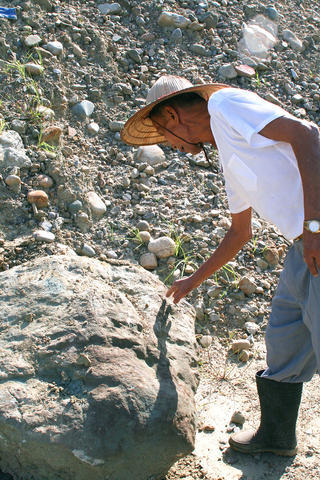A historian called yesterday for stronger conservation measures for Lo Sheng ("Happy Life") Sanatorium after discovering fossils at the construction site of an MRT maintenance depot last month.
The Taipei County sanatorium is a sprawling complex built during the Japanese colonial era to isolate people suffering from Hansen's disease, also known as leprosy. Plans to tear down most of the sanatorium's buildings to make room for an MRT maintenance depot have met with strong opposition.
Activists protested the demolition on the grounds that it meant evicting its residents.

PHOTO: LOA IOK-SIN, TAIPEI TIMES
They received support for their cause when Tamsui-based historian Chi Jung-ta (
"The hills [of Lo Sheng] are composed of sedimentary rocks, which contain fossilized remains of prehistoric marine life such as seashells, since [the area] was once seabed," Chi explained to the Taipei Times in a telephone interview.
After consulting with Chen Wen-shan (陳文山), a geoscience professor at National Taiwan University, Chi said that the fossils belonged to the Pliocene era, "which is at least 5 million years before our time," Chi said, adding that further examination would be needed to gain a more detailed picture.
Unfortunately, a lot of the rocks with fossils have been destroyed, Chi said.
"When I went to the construction site in June, I saw them [construction workers] breaking the rocks into sandstone to use as construction material," he said.
Chi said there were many tombs of Chinese settlers from the Qing Dynasty within Lo Sheng's perimeter.
"We could make the entire area into an on-site exhibition not only of Taiwan's public health history, but also of the history of settlers and of paleontology," Chi said.
Fang Juang-lih (
"I've asked the [Taipei] County Cultural Affairs Bureau and the construction firm to further investigate the matter and submit a report," he said.
"We'll decide what to do after receiving the report," he said.
Although the discovery was made last month, the construction was only halted on Tuesday after an assistant to Taipei City Councilor Lin Jui-tu (

National Kaohsiung University of Science and Technology (NKUST) yesterday promised it would increase oversight of use of Chinese in course materials, following a social media outcry over instances of simplified Chinese characters being used, including in a final exam. People on Threads wrote that simplified Chinese characters were used on a final exam and in a textbook for a translation course at the university, while the business card of a professor bore the words: “Taiwan Province, China.” Photographs of the exam, the textbook and the business card were posted with the comments. NKUST said that other members of the faculty did not see

The Taipei City Government yesterday said contractors organizing its New Year’s Eve celebrations would be held responsible after a jumbo screen played a Beijing-ran television channel near the event’s end. An image showing China Central Television (CCTV) Channel 3 being displayed was posted on the social media platform Threads, sparking an outcry on the Internet over Beijing’s alleged political infiltration of the municipal government. A Taipei Department of Information and Tourism spokesman said event workers had made a “grave mistake” and that the Television Broadcasts Satellite (TVBS) group had the contract to operate the screens. The city would apply contractual penalties on TVBS

A new board game set against the backdrop of armed conflict around Taiwan is to be released next month, amid renewed threats from Beijing, inviting players to participate in an imaginary Chinese invasion 20 years from now. China has ramped up military activity close to Taiwan in the past few years, including massing naval forces around the nation. The game, titled 2045, tasks players with navigating the troubles of war using colorful action cards and role-playing as characters involved in operations 10 days before a fictional Chinese invasion of Taiwan. That includes members of the armed forces, Chinese sleeper agents and pro-China politicians

The lowest temperature in a low-lying area recorded early yesterday morning was in Miaoli County’s Gongguan Township (公館), at 6.8°C, due to a strong cold air mass and the effect of radiative cooling, the Central Weather Administration (CWA) said. In other areas, Chiayi’s East District (東區) recorded a low of 8.2°C and Yunlin County’s Huwei Township (虎尾) recorded 8.5°C, CWA data showed. The cold air mass was at its strongest from Saturday night to the early hours of yesterday. It brought temperatures down to 9°C to 11°C in areas across the nation and the outlying Kinmen and Lienchiang (Matsu) counties,